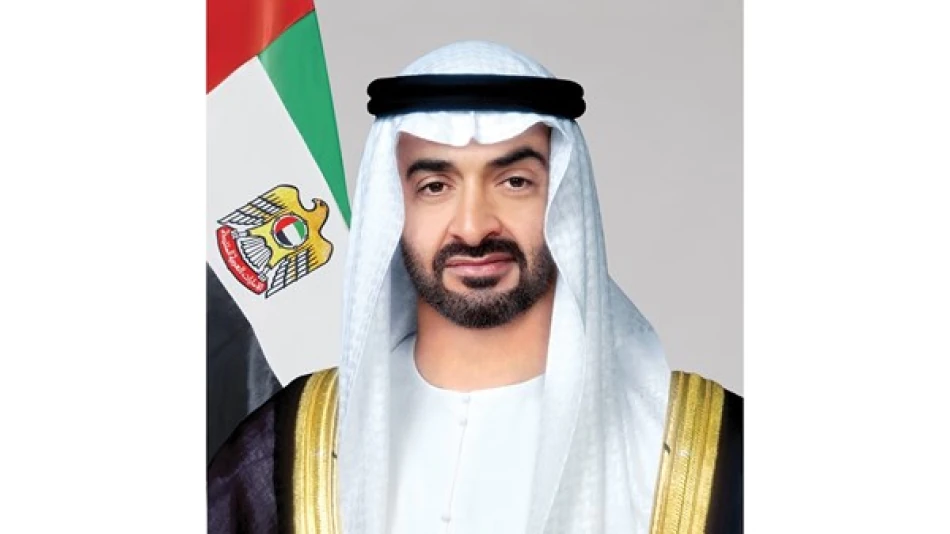
UAE President Discusses Strengthening Bilateral Ties with Angola for Mutual Development
UAE and Angola Forge Strategic Partnership as Emirates Eyes Deeper African Expansion
UAE President Sheikh Mohammed bin Zayed Al Nahyan's historic state visit to Angola marks a pivotal moment in Gulf-Africa relations, as the Emirates accelerates its strategic push into resource-rich African markets. The high-level talks in Luanda focused on expanding bilateral cooperation across energy, technology, agriculture, and logistics—sectors where the UAE has proven expertise and Angola offers substantial growth potential.
A Milestone Visit With Economic Implications
The meeting between Sheikh Mohammed bin Zayed and Angolan President João Manuel Gonçalves Lourenço represents more than diplomatic courtesy. Angola, celebrating its 50th independence anniversary this year, sits at the intersection of Africa's energy transition and economic diversification efforts—two areas where UAE investment and expertise could prove transformative.
The UAE leader emphasized that relations between the two nations are experiencing "continuous development, especially in investment and development fields," signaling a deepening economic partnership that extends beyond traditional oil sector cooperation.
Strategic Sectors in Focus
Energy and Renewable Transition
Angola's economy, heavily dependent on oil exports, mirrors the UAE's own diversification journey over the past two decades. The Emirates' experience in building renewable energy capacity—from the world's largest single-site solar park in Dubai to its ambitious Net Zero 2050 strategy—positions it as an ideal partner for Angola's energy transition goals.
Agriculture and Food Security
The focus on agriculture and food security reflects both countries' recognition of global supply chain vulnerabilities exposed during recent crises. Angola's vast arable land combined with UAE agricultural technology and investment could create a significant food production hub for the broader African market.
Broader African Strategy
Sheikh Mohammed bin Zayed's acknowledgment of Angola's current presidency of the African Union reveals the UAE's sophisticated approach to continental engagement. Rather than pursuing bilateral relationships in isolation, the Emirates recognizes Angola's influence across Africa's 54 nations—a strategic calculation that could unlock opportunities across the continent.
The UAE president noted his country's "strategic direction to enhance development partnerships with African countries," indicating this visit represents part of a broader, systematic approach to African markets rather than an opportunistic engagement.
Market and Investment Perspective
For investors, this partnership signals several key trends. First, the UAE's continued geographic diversification beyond traditional Middle Eastern and Asian markets demonstrates the Emirates' evolution into a global investment hub. Second, Angola's receptiveness to UAE investment suggests the country is serious about economic diversification beyond oil dependency.
The signing of multiple agreements and memoranda of understanding during the visit, spanning renewable energy, logistics, and agriculture, provides concrete frameworks for private sector engagement. President Lourenço specifically highlighted how these agreements will "support the Angolan economy and create job opportunities for youth," indicating government backing for UAE investments.
Regional Implications
This partnership comes as other Gulf states—particularly Saudi Arabia and Qatar—also increase their African investments. The UAE's early mover advantage in several African markets, combined with its established logistics and financial infrastructure, positions it well in this emerging competition for influence and investment opportunities.
Angola's strategic location on Africa's Atlantic coast, combined with its Portuguese-speaking ties to Brazil, offers the UAE potential access to both African and South American markets through a single partnership—a geographic advantage that amplifies the relationship's value beyond bilateral trade figures.
The emphasis on sustainable development and mutual prosperity in the leaders' discussions reflects a maturing approach to South-South cooperation, where emerging economies leverage their complementary strengths rather than simply replicating traditional donor-recipient models.
Most Viewed News

 Layla Al Mansoori
Layla Al Mansoori






